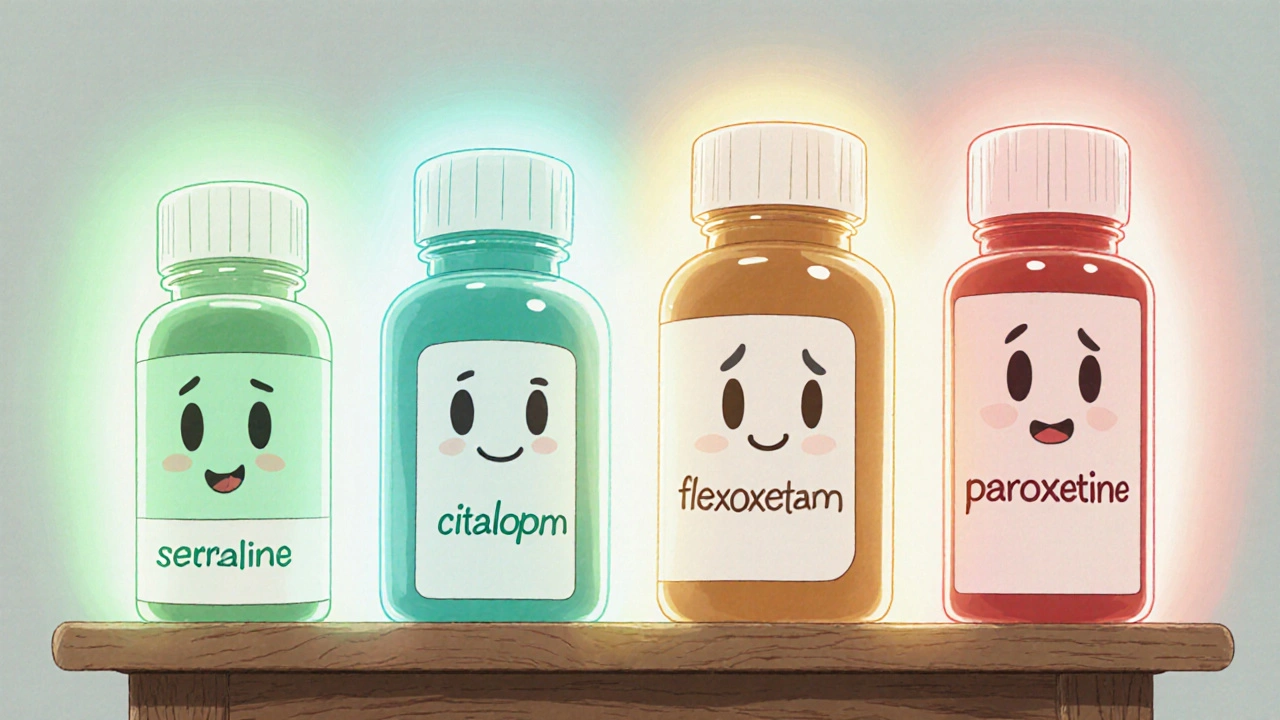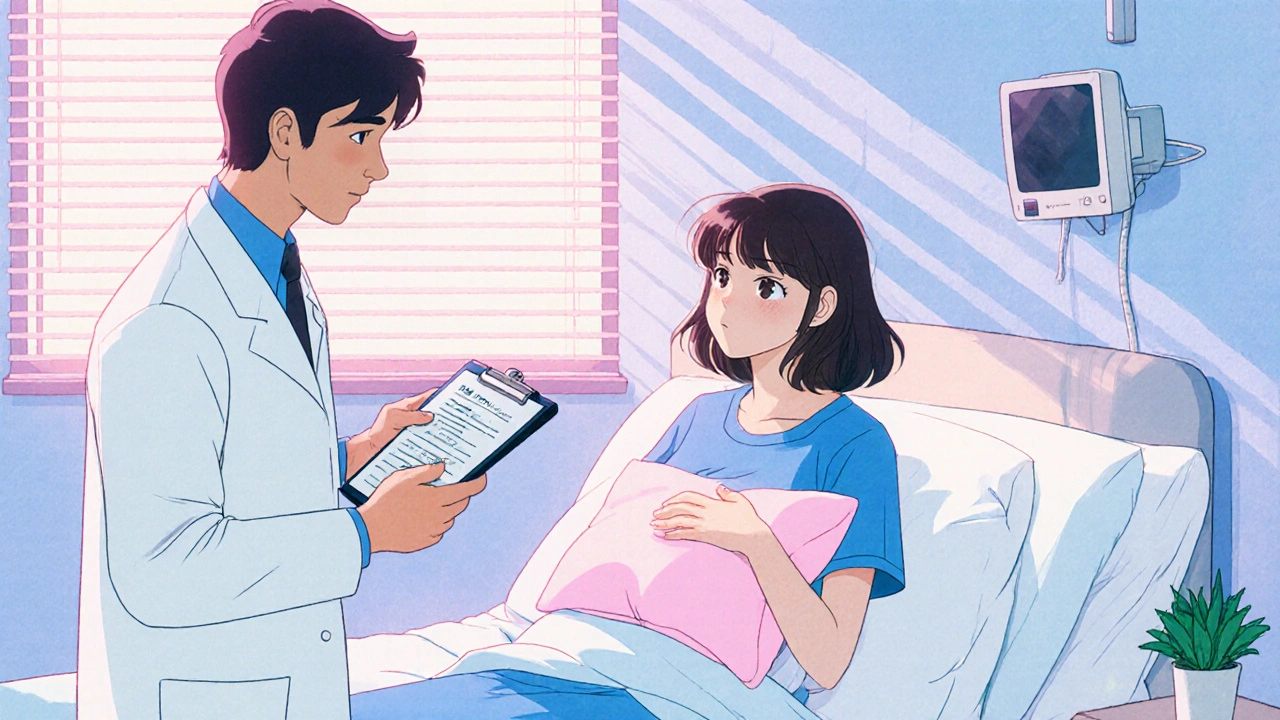Key Takeaways
- Depression affects about 14‑15% of pregnant people; untreated depression carries serious maternal and fetal risks.
- SSRIs are the most common class; sertraline and citalopram have the strongest safety records.
- Paroxetine shows a higher chance of heart defects; it should be avoided if possible.
- Neonatal adaptation syndrome occurs in ~30% of third‑trimester exposures but usually resolves within two weeks.
- Continuing a needed medication under medical supervision is generally safer than stopping abruptly.
When it comes to antidepressant use in pregnancy is a complex medical decision that weighs a mother’s mental‑health needs against possible effects on the developing baby, it’s normal to have a lot of questions.
Understanding Depression in Pregnancy
Depression isn’t just “feeling sad.” It can impair sleep, nutrition, and the ability to attend prenatal appointments. In the United States, roughly 14.5% of pregnant individuals experience a depressive episode, and the risk of suicidal behavior can be three times higher than in non‑depressed pregnant people (2024 cohort study). Untreated depression is linked to a 40% rise in preterm birth, a 30% increase in low‑birth‑weight infants, and a 25% higher chance of preeclampsia.
Main Antidepressant Classes & Safety Data
Three drug families dominate treatment:
- Selective serotonin reuptake inhibitors (SSRIs) - the first‑line choice for most clinicians.
- Serotonin‑norepinephrine reuptake inhibitors (SNRIs) - useful when anxiety co‑exists.
- Tricyclic antidepressants - reserved for specific cases due to older safety data.
Guidelines from the American College of Obstetricians and Gynecologists (ACOG) and the Society for Maternal‑Fetal Medicine (SMFM) stress that the decision should be individualized, weighing severity of symptoms, drug history, and the specific risk profile of each medication.
SSRIs: What the Evidence Says
SSRIs entered the market in the late 1980s and now account for about 75% of antidepressant prescriptions during pregnancy. Large‑scale reviews (Smith et al., 2024; Gao et al., 2018) show that when you compare women taking SSRIs to women with untreated depression, the differences in miscarriage and major congenital malformations essentially disappear. In other words, the underlying mood disorder-not the pill-drives most of the observed risk.
Among SSRIs, two agents consistently stand out:
- Sertraline (Zoloft) - most data, low placental transfer, minimal fetal growth impact.
- Citalopram (Celexa) - similar safety record, often used when sertraline isn’t tolerated.
Fluoxetine (Prozac) is also widely used but carries a slightly higher signal for persistent pulmonary hypertension of the newborn (PPHN)-about 5-6 cases per 1,000 births versus 2-3 in unexposed populations.

Special Cases: Paroxetine and Fluoxetine Risks
Paroxetine (Paxil) is the outlier. Multiple studies report a 1.5‑ to 2‑fold increase in congenital heart defects compared with other SSRIs. Expert panels recommend switching away from paroxetine before conception or as early as possible in the first trimester.
Fluoxetine’s PPHN signal, while modest, is something clinicians discuss with patients who have risk factors like maternal diabetes or smoking.
Neonatal Adaptation Syndrome
About 30% of babies exposed to SSRIs in the third trimester develop a temporary set of symptoms-jitteriness, rapid breathing, feeding difficulties, or mild irritability. This “neonatal adaptation syndrome” usually fades within the first two weeks and doesn’t predict long‑term developmental problems. Monitoring in the first few days after birth helps ensure the infant gets supportive care if needed.
Balancing Risks: Medication vs Untreated Depression
When you stack the numbers, the picture becomes clearer:
- Untreated depression: 40% higher risk of preterm birth, 30% higher risk of low birth weight, 25% higher risk of preeclampsia.
- SSRIs (excluding paroxetine): no consistent link to major birth defects, fetal growth problems, or long‑term neurodevelopmental issues.
- Stopping medication abruptly: about 68% of pregnant women who quit experience a relapse, compared with 26% who stay on treatment.
Because the dangers of untreated mood disorder often outweigh the modest medication risks, ACOG and SMFM recommend continuing a needed antidepressant rather than stopping cold turkey.

Practical Guidance for Expectant Parents & Clinicians
- Talk openly with your obstetrician and a psychiatrist early-ideally before conception.
- If medication is needed, aim for the lowest effective dose, especially in the first trimester.
- Prefer sertraline or citalopram unless there’s a compelling reason to choose another agent.
- Avoid paroxetine if possible; discuss alternatives if you’re already on it.
- Plan for possible neonatal adaptation: arrange pediatric follow‑up within the first week.
- Combine medication with non‑pharmacologic support-cognitive‑behavioral therapy, regular exercise, adequate sleep, and nutrition.
- Never stop a pill on your own. If you need to adjust, do it under medical supervision.
These steps help keep both mom and baby safe while addressing the real, often debilitating, impact of perinatal depression.
Comparison of Common SSRIs in Pregnancy
| Drug | Major congenital malformation risk | PPHN risk | Neonatal adaptation syndrome (≈%) | Typical first‑trimester dose (mg) |
|---|---|---|---|---|
| Sertraline | ~1.0 (no increase vs. no‑exposure) | ~2 per 1,000 | 25-30 | 50-100 |
| Citalopram | ~1.1 (neutral) | ~2 per 1,000 | 28-33 | 20-40 |
| Fluoxetine | ~1.2 (slight rise) | 5-6 per 1,000 | 30-35 | 20-40 |
| Paroxetine | 1.5-2.0 (heart defect concern) | ~3 per 1,000 | 28-32 | 10-25 |
Frequently Asked Questions
Is it safe to start an antidepressant after I discover I’m pregnant?
Yes, if your depression is moderate to severe. Doctors usually keep you on the lowest effective dose and may choose sertraline or citalopram because they have the best safety data.
Can I switch to a different antidepressant during pregnancy?
Switching is possible, but it should be done gradually and under close supervision to avoid withdrawal or relapse.
What are the signs of neonatal adaptation syndrome?
Newborns may be jittery, have rapid breathing, struggle with feeding, or seem unusually irritable. Symptoms usually fade within two weeks.
Should I stop my antidepressant if I’m planning a pregnancy?
Stopping abruptly raises relapse risk. Discuss a taper plan with your psychiatrist; often staying on medication is the safer route.
How does untreated depression affect my baby’s long‑term health?
Studies up to age 5 show no major developmental delays from SSRIs, but untreated depression is linked to preterm birth, which itself raises long‑term health concerns.









11 Comments
Sunita Basnet
Oct 25 2025Stay positive there are safe SSRI options
Melody Barton
Nov 7 2025You need to be firm about your treatment. It's okay to demand the best care. Don't let anyone downplay your needs.
Justin Scherer
Nov 19 2025Honestly the data shows sertraline and citalopram have the cleanest safety record, so most OB‑GYNs start there. If you’re worried about neonatal adaptation, remember it’s usually short‑lived and manageable.
Pamela Clark
Dec 1 2025Oh great, another “expert” telling us all the drugs are fine. Maybe next you’ll suggest taking vitamins to cure heart defects.
Lionel du Plessis
Dec 14 2025The pharmacokinetic profile of sertraline during gestation suggests stable placental transfer and minimal fetal accumulation
Andrae Powel
Dec 26 2025From a clinical standpoint, staying on the lowest effective dose while monitoring both mother and fetus is the most prudent approach. If side‑effects emerge, a guided taper or switch can be arranged safely.
eko lennon
Jan 7 2026When you first hear the phrase “antidepressants in pregnancy,” a wave of anxiety can crash over you like a storm at sea. Yet the literature, amassed over decades, paints a picture far more nuanced than the headlines suggest. The most common class, SSRIs, have been scrutinized in thousands of mother‑baby dyads, revealing that sertraline and citalopram sit near the top of the safety ladder. Paroxetine, on the other hand, stubbornly clings to a higher signal for cardiac anomalies, and most clinicians recommend avoiding it unless there is no viable alternative. Fluoxetine carries a modest rise in the risk of persistent pulmonary hypertension, especially in mothers who smoke or have diabetes, so that factor must be weighed carefully. Neonatal adaptation syndrome, which can make newborns jittery and hungry, appears in roughly a third of third‑trimester exposures but usually fades within two weeks, leaving no lasting harm. The alternative to medication-untreated depression-casts a much darker shadow, with statistically higher rates of preterm birth, low birth weight, and even maternal suicide. Stopping a medication abruptly can trigger a relapse in nearly 70 % of cases, underscoring the importance of a gradual, supervised taper if a change is needed. Non‑pharmacologic therapies, such as cognitive‑behavioral therapy, exercise, and mindfulness, provide valuable adjuncts, but they often cannot replace medication for moderate‑to‑severe depression. The consensus among obstetric societies is that the benefits of continued treatment usually outweigh the modest pharmacologic risks, especially when the lowest effective dose is chosen. It is also crucial to coordinate care among obstetricians, psychiatrists, and pediatricians to monitor both mother and infant through pregnancy and the postpartum period. In practice, the decision becomes a personalized risk‑benefit calculation, taking into account the severity of symptoms, prior medication response, and the presence of comorbidities. Ultimately, empowering the patient with clear, evidence‑based information enables shared decision‑making and promotes both maternal and fetal health.
Diane Holding
Jan 20 2026Great points, thanks for the depth.
Cheyanne Moxley
Feb 1 2026It’s morally unacceptable to risk a child’s heart for a mood swing. We must hold the medical community accountable and demand the safest protocols.
Kevin Stratton
Feb 14 2026Life’s choices echo in the tiny beats of a newborn’s heart – a reminder that every prescription is a pact with future selves 😊.
Manish Verma
Feb 26 2026Honestly most of these guidelines are just American fluff – our own health system knows better how to protect the next generation. Let’s trust local expertise over imported hype.